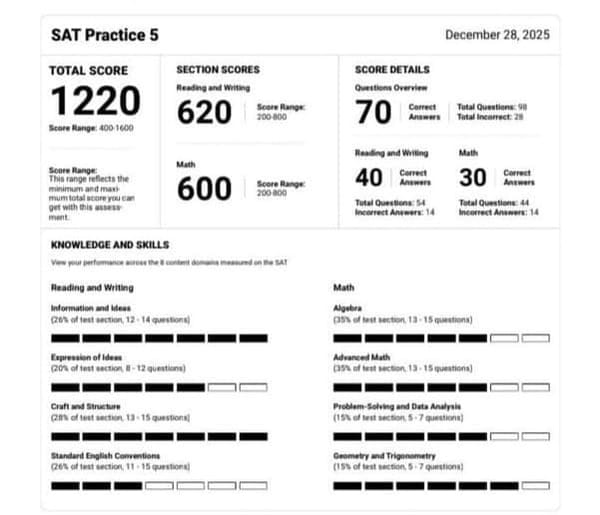The Semicolon's Decline and SAT Vocabulary Mastery

A Clever Take on the Semicolon's Fate
This week, I came across a delightful opinion piece in The Washington Post about the declining use of the semicolon in modern writing. The author's clever examination of this "endangered punctuation mark" was both entertaining and educational, offering insights into how semicolons bridge independent clauses while discussing their debatable usefulness.
While semicolons may be falling out of favor in casual communication, they remain a powerful tool for creating nuanced connections between ideas—a skill that serves students well on standardized tests and in academic writing.
https://www.washingtonpost.com/opinions/2025/06/22/punctuation-semicolon-debate/
The article reminded me why precision in language matters. Let's test your knowledge of punctuation. Can you spot the correct answer here:
SAT Writing and Language Practice
Your Blueprint for SAT Vocabulary Success
Multimodal learning and scaffolding are familiar terms in education that you learn as an education major. Yet, they aren't overused or outdated. When it comes to learning new things, often interacting with the new material in multiple formats has a way of increasing acquisition. To that end, I've been progressively updating my SAT vocabulary quizzes to help your long-term acquisition of these words. Here are a few insights you should consider when trying to expand your vocabulary:
1. Master Investigative Reading Techniques When you encounter unfamiliar words in reading passages, become a detective. Look for contrast clues (words like "however," "unlike," "despite"), definition clues (subtle synonyms or adjectives that restate the context), and example clues that illuminate meaning. The SAT HAS TO provide context that defines challenging vocabulary—train yourself to spot these linguistic breadcrumbs.
2. Study Past SAT Vocabulary Words Here's an insider secret: SAT vocabulary shows significant overlap from test to test. Words that appeared on the March 2024 exam often resurface in different forms. I maintain comprehensive lists of previously tested vocabulary, and students who review these consistently see dramatic score improvements.
3. Learn Roots and Prefixes Understanding word parts unlocks hundreds of vocabulary words at once. When you know that "ben" means good and "mal" means bad, you can decode words like "benevolent" and "malicious" even if you've never seen them before. This strategy transforms vocabulary from memorization into logical deduction.
4. Embrace Multi-Modal Learning I've developed a progressive quiz format that reinforces vocabulary through varied approaches:
- Narrative: Words presented in story context
- Flashcards: Traditional definition practice
- Matching: Connecting words to meanings
- Prefix/Root Matching: Identifying word components
- Mock Multiple Choice: SAT-style practice questions
This sequence, refined through my official SAT quizzes dating back to March 2024, ensures students encounter vocabulary in multiple contexts, strengthening retention and recall.

Time Management: Your Secret Weapon for College Application Success
Speaking of strategic planning, I had a conversation this week with a student drowning in responsibilities. Between SAT prep, school starting, extracurriculars, and college applications, he felt overwhelmed by the essay writing process. Sound familiar?
Here's the solution we developed together: dedicate just 30 minutes each morning to essay writing. That's it.
Create a simple schedule using Google Calendar or any planning tool:
- Week 1: Focus on one college's essays
- Week 2: Move to the next college
- Continue systematically through your list
Thirty minutes of focused writing each day accomplishes more than cramming for hours on weekends. You'll maintain consistency, reduce stress, and produce higher-quality work when your mind is fresh each morning.
Here's a sample prompt you could use for your ai of choice to help facilitate organization and time management:
Prompt:
College essays can feel overwhelming — especially when you're juggling multiple schools, deadlines, and drafts. But with a smart plan and steady weekly progress, you can tackle each one confidently and avoid last-minute stress.
Your task: Imgine yourself in my shoes, preparing for college admissions during a busy summer and school year. Create a weekly time management plan that breaks down your college essay writing process into small, manageable steps.
Use the following guide to help you structure your plan:
- List all the colleges you’re applying to (start with your top priority schools).
- Note the deadlines for each school.
- Group similar supplemental prompts (e.g., “Why Us?” or “Community” essays).
- Map out your weeks, starting from this week until your earliest deadline.
- Assign specific writing tasks to each week — for example:
- Brainstorm and outline one school's essays
- Write a rough draft
- Revise and polish
- Ask for feedback and edit
- Build in time for revisiting your Common App personal statement, especially early on.
- Plan to finish each school's essays at least 1–2 weeks before the deadline.
You can format this as a calendar, checklist, or weekly planner — whatever helps you stay accountable. Your final product should make it crystal clear what you're working on each week and when each college will be “done.”
A Final Word on AI and Authenticity
Use AI tools to organize your schedule, research colleges, and streamline your application process—but write your own essays. Admissions officers can spot artificial writing, and more importantly, your authentic voice is what sets you apart from thousands of other applicants.
Questions about SAT prep or college application strategies? Email us or schedule a consultation. We're here to help you succeed.





